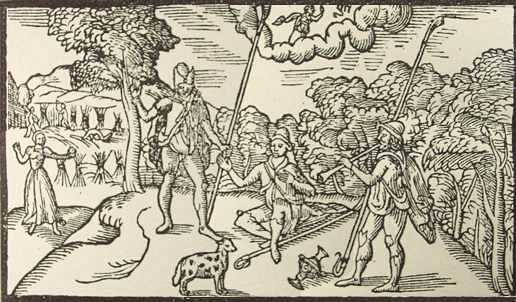Stinking idols?
Many Elizabethan festivals had their roots in pagan customs. The May Day celebration, had its origins in ancient fertility rituals, and puritans like Philip Stubbes connected the festivities with licentious behaviour. While it was customary for young men and women to rise early to observe the rite, Stubbes suggested that they also went "some to the woods and groves, some to the hills and mountains, some to one place and some to another, where they spend all the night in pleasant pastimes; and in the morning they return, bringing with them birch boughs and branches of trees, to deck their assemblies withal." Stubbes also reported that he had "heard it credibly reported. . . that of fortie, threescore, or a hundred maides going to the wood over night, there have scarcely the third part of them returned home again undefiled." The phallic symbolism of the maypole itself outraged Puritans, who called it a "stinking idol."
The women harvesting in the background of this illustration, and in others in this section, remind us that the neat traditional division of labour between men (who were to work outside) and women (who were to work in the house and yard) broke down when important labour-intensive activities like harvesting took over.
There is no evidence that men reciprocated by doing the dishes.
Footnotes
-
Stubbes
Phillip Stubbes on May Day, quoted more fully:
... Against May, Whitsonday [the seventh Sunday after Easter: around May 31 or June 1] or other time, all the yung men and maides, olde men and wives run gadding over night to the woods, groves, hils & mountains, where they spend all the night in plesant pastimes, & in the morning they return bringing w[ith] them birch & branches of trees, to deck their assemblies withall, and no mervaile, for there is a great Lord present amongst them, as superintendent and Lord over their pastimes and sportes, namely, Sathan prince of hel: But the cheifest jewel they bring from thence is their May-pole, which they bring home with great veneration, as thus. They have twentie or fortie yoke of Oxen, every Oxe having a sweet nose-gay of floures placed on the tip of his hornes, and these Oxen drawe home this May-pole (this stinking idol rather) which is covered all over with floures, and hearbs bound round about with strings from the top to the bottome, and sometime painted with variable colours, with two or three hundred men, women and children following it with great devotion. And thus being reared up, with two handkercheefs and flags hovering on the top, they straw the ground round about, binde green boughes about it, set up sommer haules, bowers and arbors hard by it. And then fall they to daunce about like as the heathen people did at the dedication of the Idols, where of this is a perfect pattern, or rather the thing itself. I have heard it credibly reported (and that, viva voce) by men of great gravitie and reputation, that of fortie, threescore, or a hundred maides going to the wood over night, there have scaresly the third part of them returned home againe undefiled.
These be the frutes which these cursed pastimes bring forth. Neither the Jewes, the Turcks, Sarasins, nor pagans, nor any other nations how wicked, or barbarous soever, have ever used such devilish exercises as these, nay they would have been ashamed once to have named them, much lesse, have used them. Yet wee that would be Christians, think them not amisse. The Lord forgive us, and remoove them from us.
The Anatomie of Abuses (1583).
